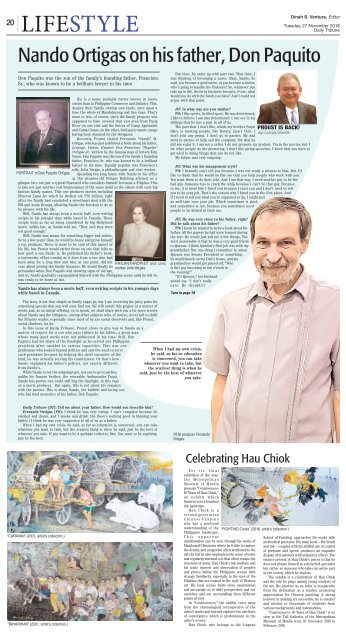27 NOVEMBER 2018_1
Create successful ePaper yourself
Turn your PDF publications into a flip-book with our unique Google optimized e-Paper software.
20<br />
LIFESTYLE<br />
Dinah S. Ventura, Editor<br />
Tuesday, <strong>27</strong> November <strong>2018</strong><br />
Daily Tribune<br />
Nando Ortigas on his father, Don Paquito<br />
Don Paquito was the son of the family’s founding father, Francisco<br />
Sr., who was known to be a brilliant lawyer in his time<br />
His is a name probably better known in movie<br />
circles than in Philippine Commerce and Industry. This,<br />
despite their family owning vast lands, once upon a<br />
time the whole of Mandaluyong and San Juan. That’s<br />
more or less, of course, since the family property was<br />
supposed to have covered that vast area from Pasig<br />
River on one side and the fences of Camp Aguinaldo<br />
and Camp Crame, on the other, both government camps<br />
having been donated by the Ortigases.<br />
Recently, Proust visited Fernando “Nando” M.<br />
Ortigas, who has just published a book about his father,<br />
Lineage, Vision, Empire: Don Francisco “Paquito”<br />
Ortigas Jr., written by the famous man of letters Krip<br />
Yuson. Don Paquito was the son of the family’s founding<br />
father, Francisco Sr. who was known to be a brilliant<br />
lawyer in his time. Equally popular was Francisco’s<br />
wife, Julia Vargas, a philanthropist and civic worker.<br />
PORTRAIT of Don Paquito Ortigas. Spending two long hours with Nando in his office<br />
at the decades-old Ortigas Building allowed us a<br />
glimpse into not just a typical Spaniard who considers himself foremost a Filipino. This<br />
is also not just another rich businessman of the same mold as the others with such big<br />
famous family names. This one produces movies including<br />
Heneral Luna for which he shelled out P70 million, right<br />
after the family had concluded a sweetheart deal with the<br />
SM and Ayala Groups, allowing Nando the freedom to do as<br />
he pleases with his life.<br />
Well, Nando has always been a movie buff, even writing<br />
scripts in his younger days while based in Canada. Those<br />
scripts went as far as being considered by big Hollywood<br />
movie outfits but, as Nando told me, “They said they were<br />
not good enough.”<br />
Well, Nando was meant for something bigger and nobler,<br />
for in a few years’ time, he would be home and prove himself<br />
a top producer. There is more to be said of this aspect of<br />
his life, but Proust would rather focus on one that tells us<br />
how good a son Nando is. He published his father’s book,<br />
a noteworthy effort coming as it does from a son who had<br />
been away for a long time and who, at one point, did not<br />
care about joining the family business. He would finally be<br />
persuaded when Don Paquito was showing signs of old age,<br />
and so, Nando gradually reacquainted himself with the Philippine scene until he felt he<br />
was ready to be home at last.<br />
The story is not that simple as family sagas go, but I am reserving the juicy parts for<br />
something special that you will soon find out. We will unveil this project in a matter of<br />
weeks and, as an initial offering, so to speak, we shall share with you a lot more stories<br />
about Nando and the Ortigases, among other subjects who, of course, never fail to thrill<br />
the Filipino reader, especially since most of us are social observers and, like Proust,<br />
social climbers, ha ha.<br />
In this issue of Daily Tribune, Proust chose to give way to Nando as a<br />
matter of respect for a son who pays tribute to his father, a great man<br />
whose many good works were not publicized in his time. Still, Don<br />
Paquito had his share of the limelight as he served one Philippine<br />
president after another in various capacities. This was one<br />
gentleman who looked beyond politics and saw the need to serve<br />
each president because by helping the chief executive of the<br />
land, he was actually serving his countrymen. Or that’s how<br />
Nando explained his father’s politics, not exactly different<br />
from Nando’s.<br />
While Nando is not the outgoing type, not one to go to parties,<br />
unlike his famous brother, the venerable Ambassador Paqui,<br />
Nando has proven one could still hog the limelight, in this case<br />
as a movie producer. But again, this is not about his romance<br />
with the movies. This is about Nando, the faithful and loving son<br />
who has fond memories of his father, Don Paquito.<br />
PHILANTHROPIST and civic<br />
worker Julia Vargas.<br />
Nando has always been a movie buff, even writing scripts in his younger days<br />
while based in Canada. Turn to page 19<br />
But then, he came up with part two. That time, I<br />
was thinking of becoming a nurse. Okay, Nando, he<br />
said, you become a good nurse, or you become a doctor,<br />
who’s going to handle the finances? So, whatever you<br />
take up in life, throw in business because, if not, what<br />
would you do with the funds you have? And I could not<br />
argue with that point.<br />
DT: In what way are you similar?<br />
FO: I like sports, he liked sport. He was determined,<br />
I like to believe I am also determined. I can see in my<br />
siblings that he has a part in all of us.<br />
The part that I don’t like, which my brother Paqui<br />
likes, is meeting people, like Rotary, Lion’s Club. I<br />
don’t join any group. I don’t go to parties. My dad<br />
went to parties to help sell the company. Not that he<br />
did not enjoy it. I am not a seller. I do not promote my product. I’m in the movies, but I<br />
let other people do the promoting. I don’t like giving speeches. I know that you have to<br />
get used to doing things that you do not like.<br />
My father was very outgoing.<br />
DT: What was his management style?<br />
FO: I honestly can’t tell you because I was not really a witness to that. But I’d<br />
like to think that he would be like me that you help people who work with you.<br />
You trust them to do their jobs. And I am that way. I need another guy to be the<br />
bad guy. Someone has to crack the whip because I can’t be that guy. Because,<br />
to me, it is more like I hired you because I trust you and I don’t need to tell<br />
you to do your job. That’s the reason why I hired you in the first place. And<br />
if I need to tell you what you’re supposed to do, I might just<br />
as well take over your job. Which sometimes is good,<br />
and sometimes is not, because you sometimes need<br />
people to be kicked in their ass.<br />
DT: He was very close to his father, right?<br />
Did he talk about his father?<br />
FO: I know he wanted to write a book about his<br />
father. All the papers he had were burned during<br />
the war. He would just tell me a few things. The<br />
most memorable is that he was a very good friend<br />
to Quezon. I think Quezon’s first job was with my<br />
grandfather. But one thing I remember is, when<br />
Quezon was Senate President or something,<br />
he would knock on my Dad’s house, and my<br />
grandmother would get pissed off, “Who<br />
is this guy knocking at ten o’clock in<br />
the evening?”<br />
“It’s Quezon,” her husband<br />
would say. “I don’t really<br />
care. He shouldn’t<br />
When I had my own crisis,<br />
he said, as far as education<br />
is concerned, you can take<br />
whatever you want to take, but<br />
the scariest thing is when he<br />
said, just be the best of whatever<br />
you take.<br />
PROUST IS BACK!<br />
Jojo Gumpal Silvestre<br />
Daily Tribune (DT): Tell me about your father. How would you describe him?<br />
Fernando Ortigas (FO): I think he was very caring. I can’t complain because he<br />
smoked and drank, and I smoke and drink. (So there’s nothing good in blaming your<br />
father.) I think he was very supportive to all of us as a father.<br />
When I had my own crisis, he said, as far as education is concerned, you can take<br />
whatever you want to take, but the scariest thing is when he said, just be the best of<br />
whatever you take. If you want to be a garbage collector, fine. You want to be anything,<br />
just be the best.<br />
FILM producer Fernando<br />
Ortigas.<br />
“CARAVAN” (2001, artist’s collection.)<br />
“BAYANIHAN” (2001, artist’s collection.)<br />
Celebrating Hau Chiok<br />
For its final<br />
exhibition of the year,<br />
the Metropolitan<br />
Museum of Manila<br />
presents “Coalescences:<br />
60 Years of Hau Chiok,”<br />
an exhibit which<br />
features over a hundred<br />
ink paintings.<br />
Hau Chiok is a<br />
second-generation<br />
Chinese-Filipino<br />
who has a profound<br />
understanding of the<br />
Philippine landscape.<br />
This apparent<br />
manifestation can be seen through his works of<br />
Manila and Chinatown where he is able to capture<br />
the density and congestion often attributed to the<br />
old city but he also emphasizes the sense of order<br />
and regularity internal to it that often escape the<br />
attention of many. Hau Chiok’s ink medium and<br />
his acute interest and observation of peoples<br />
and places imbue his Philippine scenes with<br />
strange familiarity, especially in the eyes of the<br />
Filipinos that are trained in the style of Western<br />
art. His local scenes invite close examination<br />
and encourage us to shift perspectives and see<br />
ourselves and our surroundings from different<br />
points of view.<br />
In “Coalescences,” the exhibit veers away<br />
from the chronological retrospective of the<br />
artist’s works and instead explores the attribute<br />
of convergence which is predominant in the<br />
artist’s oeuvre.<br />
Hau Chiok, who belongs to the Lingnan<br />
“FIGHTING Cocks” (2016, artist’s collection.)<br />
School of Painting, approaches his works with<br />
methodical precision. His main tools — the brush<br />
and ink — coupled with his skillful use of control<br />
of pressure and speed, produces an exquisite<br />
display of brushwork with unlimited effects. The<br />
nuance present in Hau Chiok’s pieces is that he<br />
does not situate himself as a detached spectator<br />
but rather as someone who takes an active part<br />
in the society which he depicts.<br />
The exhibit is a celebration of Hau Chiok<br />
and the role he plays among young students of<br />
the art. His practice as an artist is inseparable<br />
from his dedication as a teacher promoting<br />
appreciation for Chinese painting. A strong<br />
believer in making art accessible, he is teacher<br />
and mentor to thousands of students from<br />
various backgrounds and nationalities.<br />
“Coalescences: 60 Years of Hau Chiok” is on<br />
view at the Tall Galleries of the Metropolitan<br />
Museum of Manila from 16 November <strong>2018</strong> to<br />
February 2019.


















